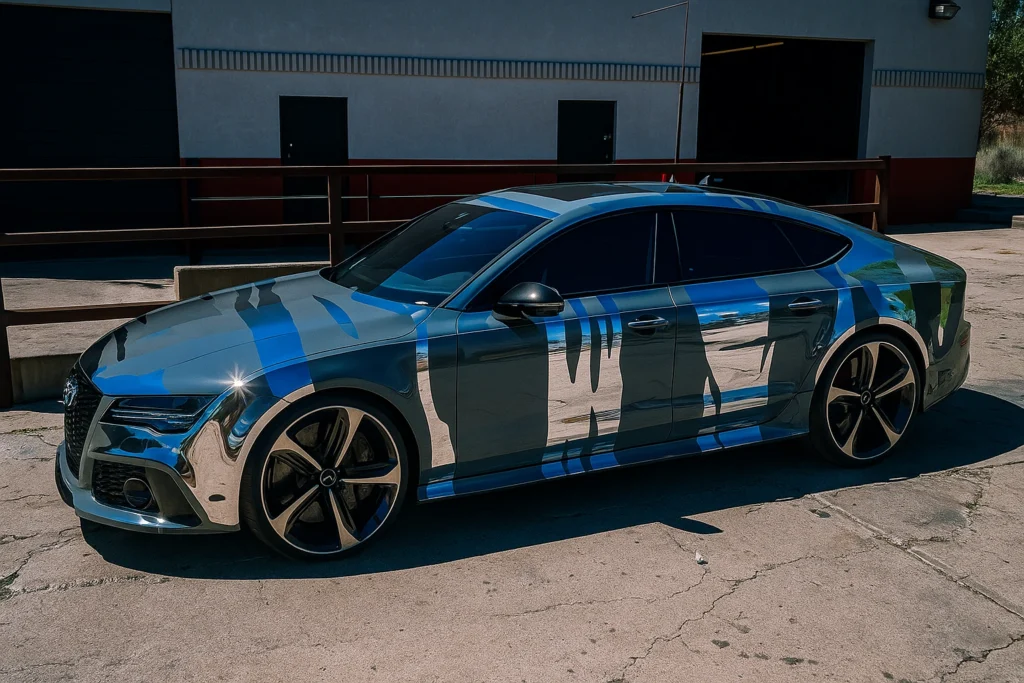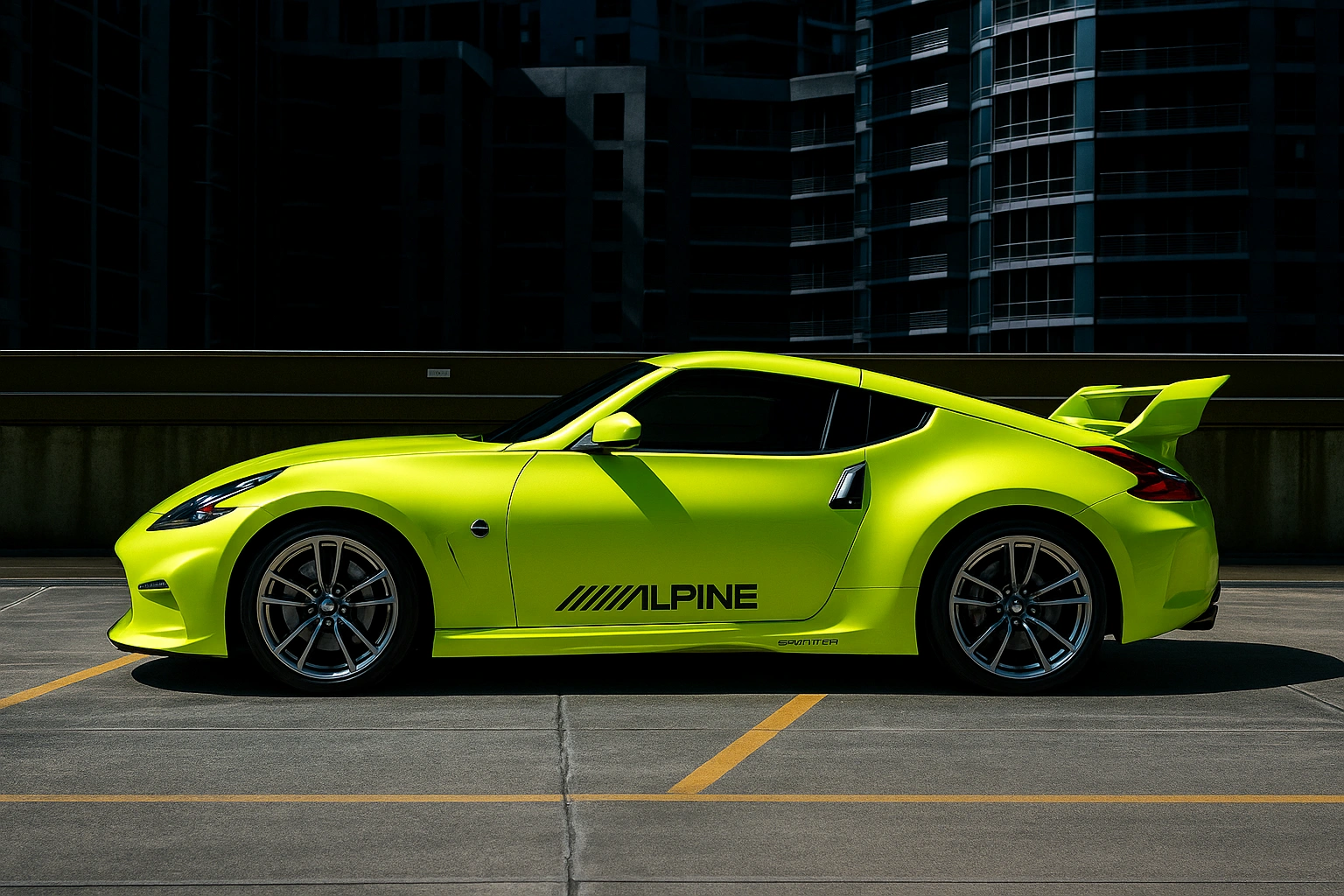Introduction
Can you wrap a car at home? Yes, with the right tools, patience, and attention to detail, you can install vinyl wraps yourself. DIY vehicle wrap projects are increasingly popular among USA car enthusiasts looking to customize their ride while saving money.
However, DIY wrapping has a steep learning curve, and results often differ from professional car wrap installation. Wrapping your own car without proper prep or technique can lead to bubbles, wrinkles, or premature peeling.
In this guide, we’ll explore the key FAQs USA car owners ask before attempting a home wrap. We’ll cover costs, tools, finishes, and tips for a seamless DIY car wrap experience. Whether you’re considering a full vehicle wrap or just experimenting on a panel, this guide helps you decide if DIY car wrapping is worth it.
Key Takeaways
- Wrapping a car at home is possible but requires precision, tools, and a dust-free workspace.
- DIY car wraps save money but risk bubbles, wrinkles, or peeling if not applied correctly.
- Surface prep (cleaning, scratch repair, and trim removal) is essential for long-lasting results.
- Professional wraps provide better durability and finish, especially for businesses and fleets.
- Choosing the right vinyl finish (Gloss, Matte, Satin, Chrome) affects difficulty and appearance.
- Learning with smaller panels before attempting a full car wrap can improve success rates.

Why Consider a DIY Vehicle Wrap?
DIY vehicle wrap projects have surged in popularity among USA car owners. Many seek customization options like color changes, matte finishes, or chameleon wraps without paying professional labor fees.
Pros of DIY Car Wrap at Home:
- Cost savings: Avoid $2,000–$5,000 professional installation fees.
- Creative control: Choose your finish, patterns, and designs.
- Learning experience: Gain hands-on skills for future projects.
Cons of Wrapping Your Own Car:
- Risk of imperfections: Bubbles, wrinkles, or peeling are common mistakes.
- Time-consuming: Full wraps can take 10–20+ hours for beginners.
- Tool investment: Heat guns, squeegees, knives, and cleaning solutions add up.
Many USA car owners start small, applying wraps to mirrors, hoods, or bumpers before attempting a full vehicle wrap.
Tools You Need to Wrap a Car at Home
A successful DIY car wrap requires the right tools:
- Vinyl wrap film (premium brands recommended for USA climate)
- Squeegees (felt-edge to avoid scratches)
- Heat gun (for stretching and contouring the vinyl)
- Utility knife / cutting blades
- Measuring tape & masking tape
- Surface cleaning supplies (isopropyl alcohol, microfiber towels)
- Gloves (to avoid fingerprints or dust)
A controlled indoor space is crucial to prevent dust under the vinyl. Specialty finishes such as Gloss, Matte, Satin, or Chrome require more precise handling, making professional tools almost mandatory for larger cars.
Preparing Your Car for a DIY Wrap
Proper prep work is the foundation of a long-lasting wrap. Skipping steps can lead to adhesion issues and poor results.
Steps for DIY Car Wrap Prep:
- Clean and degrease the surface: Wash with car shampoo, then use isopropyl alcohol.
- Repair scratches or chips: Vinyl does not hide deep scratches, see can you wrap over bad paint or scratches?.
- Remove trim and badges: Helps achieve cleaner edges and easier application.
- Dry and dust-free environment: Even a single dust particle can create bubbles.
USA weather can affect vinyl adhesion; extremely hot or cold temperatures make DIY application harder. A garage with stable temperature is ideal.
Step-by-Step DIY Car Wrap Process
- Measure and cut vinyl: Cut panels slightly larger than the car surface.
- Apply vinyl to flat sections first: Start with doors or hood. Use squeegee to remove air bubbles.
- Heat and stretch for curves: Use a heat gun to conform vinyl around bumpers, mirrors, and fenders.
- Trim excess: Carefully cut along edges, leaving enough overlap.
- Post-heat for adhesion: Ensure edges are sealed and vinyl is fully bonded.
Tip: Practice on small panels first before wrapping your entire car. Mistakes can be costly in time and material.
Cost Comparison: DIY vs Professional Wraps (USA)
| Option | Cost Range (USD) | Pros | Cons |
| DIY Car Wrap at Home | $500-$1,000 | Lower upfront cost, hands-on experience | Risk of errors, time-consuming, may reduce wrap lifespan |
| Professional Installation | $2,000-$5,000 | Flawless finish, warranty, expert tools | Higher upfront cost |
While DIY wraps save money, mistakes often lead to wasted vinyl and extra time. For fleet vehicles or show cars, professional installation is usually the better investment.
How Long Does a DIY Car Wrap Last?
A carefully applied DIY wrap typically lasts 2-3 years, depending on vinyl quality, prep work, and aftercare. Professional wraps can last 5-7 years, especially when using premium brands like 3M or Avery Dennison.
Tips to Maximize Wrap Lifespan:
- Hand wash only; avoid harsh chemicals.
- Park in shaded areas to reduce UV damage.
- Avoid pressure washing at close range or high temperatures.
Vinyl Wrap Pro offers a detailed vinyl wrap maintenance guide for long-lasting results.
Choosing the Right Vinyl Finish
Different vinyl finishes impact both aesthetics and installation difficulty:
- Gloss: Easiest for DIY; mirrors factory paint.
- Matte: Slightly harder; fingerprints and imperfections show more.
- Satin: Medium difficulty; combines gloss and matte properties.
- Chrome/Metallic: Hardest; requires precise heating and stretching.
For detailed comparison, see Gloss vs Matte vs Satin vs Chrome: Which Finish Should You Choose?
Vinyl Wrap FAQs
Yes, you can wrap a car at home if you have patience, basic tools, and a clean, dust-free garage. Practice on smaller panels before attempting a full car wrap.
You’ll need vinyl, squeegees, heat gun, utility knives, measuring tape, and cleaning supplies. Proper tools reduce risk of bubbles or tearing.
Yes, vinyl cannot hide deep scratches. Wrapping over damaged paint may cause peeling or uneven adhesion. See can you wrap over bad paint or scratches?
Expect $500-$1,000 for vinyl and tools. Professional installations range $2,000-$5,000 with higher durability and warranty.
2-3 years if applied carefully and maintained. Professionals can extend lifespan to 5-7 years.
DIY is great for hobbyists or those saving on labor costs. For show cars, fleets, or commercial vehicles, professional wraps deliver superior results.
Extreme heat or cold affects vinyl adhesion. Ideal DIY conditions are 60-75°F (15-24°C) indoors.
Bubbles, wrinkles, uneven edges, and improper trimming. Using a heat gun incorrectly can also damage the vinyl.
Yes, with the right tools, prep, and patience. Beginners should start with small panels.
Yes, upfront costs are lower, but mistakes can increase expenses.
Gloss vinyl is the easiest to handle and forgiving for beginners.
Typically 2-3 years with proper prep and maintenance.
Yes, but it is challenging. Many DIYers enlist a friend for large panels.
Final Thoughts + CTA
Wrapping a car at home can be rewarding, educational, and cost-saving. For USA car owners, the key to success is proper prep, patience, and using the right tools. DIY wraps are great for hobbyists or small-scale projects, while professionals like Vinyl Wrap Pro deliver flawless finishes and long-lasting results for full vehicles or fleets.
Ready to try a DIY car wrap or explore professional installation? Check out our full car wrap installation process step-by-step or learn about Gloss vs Matte vs Satin vs Chrome finishes to choose your perfect style.

